You are using an outdated browser. Upgrade your browser today or install Google Chrome Frame to better experience this site.

Fiji Traveler View
Travel health notices, vaccines and medicines, non-vaccine-preventable diseases, stay healthy and safe.
- Packing List
After Your Trip
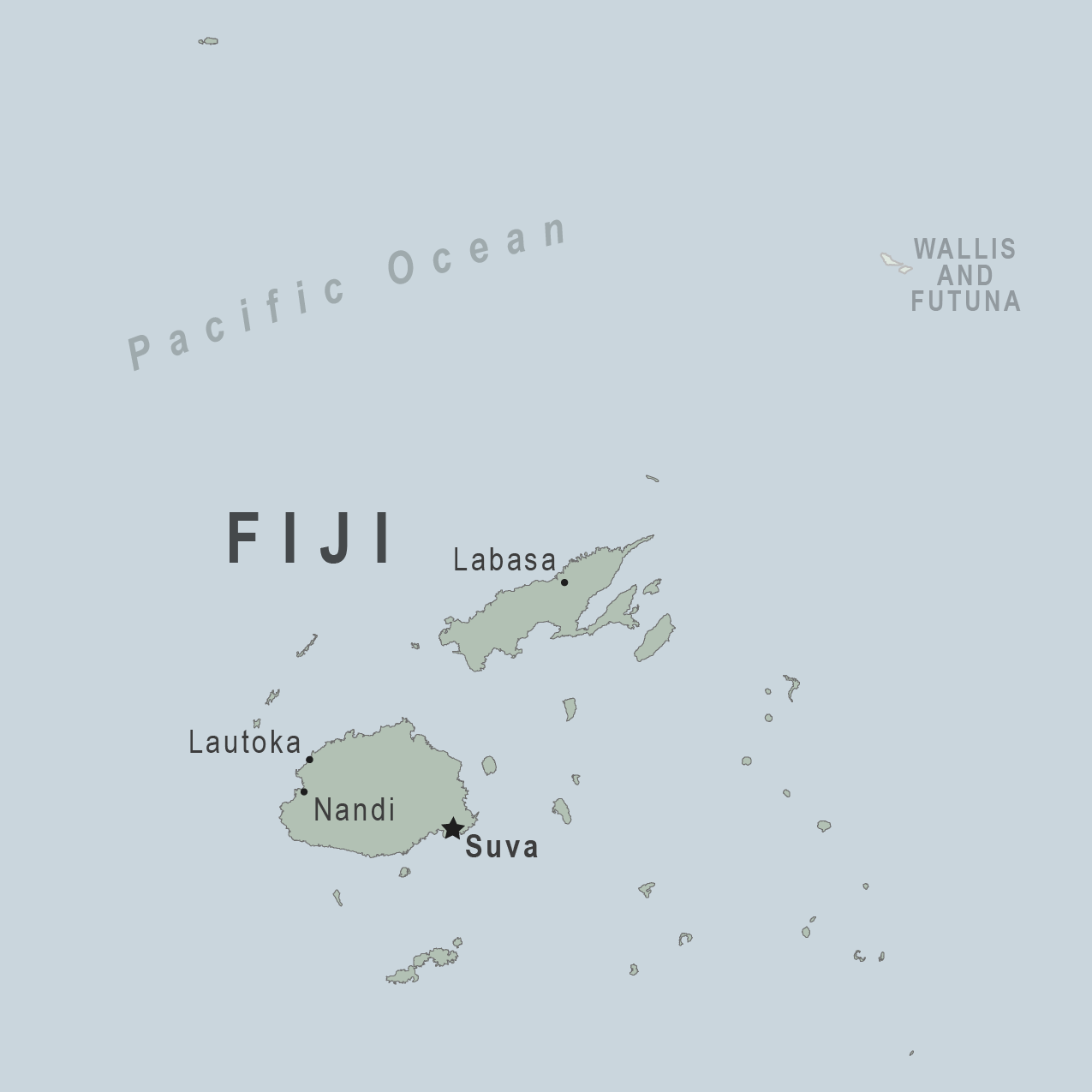
There are no notices currently in effect for Fiji.
⇧ Top
Check the vaccines and medicines list and visit your doctor at least a month before your trip to get vaccines or medicines you may need. If you or your doctor need help finding a location that provides certain vaccines or medicines, visit the Find a Clinic page.
Avoid contaminated water
Leptospirosis
How most people get sick (most common modes of transmission)
- Touching urine or other body fluids from an animal infected with leptospirosis
- Swimming or wading in urine-contaminated fresh water, or contact with urine-contaminated mud
- Drinking water or eating food contaminated with animal urine
- Avoid contaminated water and soil
- Avoid floodwater
Clinical Guidance
Avoid bug bites.
- Mosquito bite
- Avoid Bug Bites
- An infected pregnant woman can spread it to her unborn baby
Airborne & droplet
- Breathing in air or accidentally eating food contaminated with the urine, droppings, or saliva of infected rodents
- Bite from an infected rodent
- Less commonly, being around someone sick with hantavirus (only occurs with Andes virus)
- Avoid rodents and areas where they live
- Avoid sick people
Tuberculosis (TB)
- Breathe in TB bacteria that is in the air from an infected and contagious person coughing, speaking, or singing.
Learn actions you can take to stay healthy and safe on your trip. Vaccines cannot protect you from many diseases in Fiji, so your behaviors are important.
Eat and drink safely
Food and water standards around the world vary based on the destination. Standards may also differ within a country and risk may change depending on activity type (e.g., hiking versus business trip). You can learn more about safe food and drink choices when traveling by accessing the resources below.
- Choose Safe Food and Drinks When Traveling
- Water Treatment Options When Hiking, Camping or Traveling
- Global Water, Sanitation and Hygiene (WASH)
- Avoid Contaminated Water During Travel
You can also visit the Department of State Country Information Pages for additional information about food and water safety.
Prevent bug bites
Bugs (like mosquitoes, ticks, and fleas) can spread a number of diseases in Fiji. Many of these diseases cannot be prevented with a vaccine or medicine. You can reduce your risk by taking steps to prevent bug bites.
What can I do to prevent bug bites?
- Cover exposed skin by wearing long-sleeved shirts, long pants, and hats.
- Use an appropriate insect repellent (see below).
- Use permethrin-treated clothing and gear (such as boots, pants, socks, and tents). Do not use permethrin directly on skin.
- Stay and sleep in air-conditioned or screened rooms.
- Use a bed net if the area where you are sleeping is exposed to the outdoors.
What type of insect repellent should I use?
- FOR PROTECTION AGAINST TICKS AND MOSQUITOES: Use a repellent that contains 20% or more DEET for protection that lasts up to several hours.
- Picaridin (also known as KBR 3023, Bayrepel, and icaridin)
- Oil of lemon eucalyptus (OLE) or para-menthane-diol (PMD)
- 2-undecanone
- Always use insect repellent as directed.
What should I do if I am bitten by bugs?
- Avoid scratching bug bites, and apply hydrocortisone cream or calamine lotion to reduce the itching.
- Check your entire body for ticks after outdoor activity. Be sure to remove ticks properly.
What can I do to avoid bed bugs?
Although bed bugs do not carry disease, they are an annoyance. See our information page about avoiding bug bites for some easy tips to avoid them. For more information on bed bugs, see Bed Bugs .
For more detailed information on avoiding bug bites, see Avoid Bug Bites .
Stay safe outdoors
If your travel plans in Fiji include outdoor activities, take these steps to stay safe and healthy during your trip.
- Stay alert to changing weather conditions and adjust your plans if conditions become unsafe.
- Prepare for activities by wearing the right clothes and packing protective items, such as bug spray, sunscreen, and a basic first aid kit.
- Consider learning basic first aid and CPR before travel. Bring a travel health kit with items appropriate for your activities.
- If you are outside for many hours in heat, eat salty snacks and drink water to stay hydrated and replace salt lost through sweating.
- Protect yourself from UV radiation : use sunscreen with an SPF of at least 15, wear protective clothing, and seek shade during the hottest time of day (10 a.m.–4 p.m.).
- Be especially careful during summer months and at high elevation. Because sunlight reflects off snow, sand, and water, sun exposure may be increased during activities like skiing, swimming, and sailing.
- Very cold temperatures can be dangerous. Dress in layers and cover heads, hands, and feet properly if you are visiting a cold location.
Stay safe around water
- Swim only in designated swimming areas. Obey lifeguards and warning flags on beaches.
- Practice safe boating—follow all boating safety laws, do not drink alcohol if driving a boat, and always wear a life jacket.
- Do not dive into shallow water.
- Do not swim in freshwater in developing areas or where sanitation is poor.
- Avoid swallowing water when swimming. Untreated water can carry germs that make you sick.
- To prevent infections, wear shoes on beaches where there may be animal waste.
Keep away from animals
Most animals avoid people, but they may attack if they feel threatened, are protecting their young or territory, or if they are injured or ill. Animal bites and scratches can lead to serious diseases such as rabies.
Follow these tips to protect yourself:
- Do not touch or feed any animals you do not know.
- Do not allow animals to lick open wounds, and do not get animal saliva in your eyes or mouth.
- Avoid rodents and their urine and feces.
- Traveling pets should be supervised closely and not allowed to come in contact with local animals.
- If you wake in a room with a bat, seek medical care immediately. Bat bites may be hard to see.
All animals can pose a threat, but be extra careful around dogs, bats, monkeys, sea animals such as jellyfish, and snakes. If you are bitten or scratched by an animal, immediately:
- Wash the wound with soap and clean water.
- Go to a doctor right away.
- Tell your doctor about your injury when you get back to the United States.
Consider buying medical evacuation insurance. Rabies is a deadly disease that must be treated quickly, and treatment may not be available in some countries.
Reduce your exposure to germs
Follow these tips to avoid getting sick or spreading illness to others while traveling:
- Wash your hands often, especially before eating.
- If soap and water aren’t available, clean hands with hand sanitizer (containing at least 60% alcohol).
- Don’t touch your eyes, nose, or mouth. If you need to touch your face, make sure your hands are clean.
- Cover your mouth and nose with a tissue or your sleeve (not your hands) when coughing or sneezing.
- Try to avoid contact with people who are sick.
- If you are sick, stay home or in your hotel room, unless you need medical care.
Avoid sharing body fluids
Diseases can be spread through body fluids, such as saliva, blood, vomit, and semen.
Protect yourself:
- Use latex condoms correctly.
- Do not inject drugs.
- Limit alcohol consumption. People take more risks when intoxicated.
- Do not share needles or any devices that can break the skin. That includes needles for tattoos, piercings, and acupuncture.
- If you receive medical or dental care, make sure the equipment is disinfected or sanitized.
Know how to get medical care while traveling
Plan for how you will get health care during your trip, should the need arise:
- Carry a list of local doctors and hospitals at your destination.
- Review your health insurance plan to determine what medical services it would cover during your trip. Consider purchasing travel health and medical evacuation insurance.
- Carry a card that identifies, in the local language, your blood type, chronic conditions or serious allergies, and the generic names of any medications you take.
- Some prescription drugs may be illegal in other countries. Call Fiji’s embassy to verify that all of your prescription(s) are legal to bring with you.
- Bring all the medicines (including over-the-counter medicines) you think you might need during your trip, including extra in case of travel delays. Ask your doctor to help you get prescriptions filled early if you need to.
Many foreign hospitals and clinics are accredited by the Joint Commission International. A list of accredited facilities is available at their website ( www.jointcommissioninternational.org ).
In some countries, medicine (prescription and over-the-counter) may be substandard or counterfeit. Bring the medicines you will need from the United States to avoid having to buy them at your destination.
Select safe transportation
Motor vehicle crashes are the #1 killer of healthy US citizens in foreign countries.
In many places cars, buses, large trucks, rickshaws, bikes, people on foot, and even animals share the same lanes of traffic, increasing the risk for crashes.
Be smart when you are traveling on foot.
- Use sidewalks and marked crosswalks.
- Pay attention to the traffic around you, especially in crowded areas.
- Remember, people on foot do not always have the right of way in other countries.
Riding/Driving
Choose a safe vehicle.
- Choose official taxis or public transportation, such as trains and buses.
- Ride only in cars that have seatbelts.
- Avoid overcrowded, overloaded, top-heavy buses and minivans.
- Avoid riding on motorcycles or motorbikes, especially motorbike taxis. (Many crashes are caused by inexperienced motorbike drivers.)
- Choose newer vehicles—they may have more safety features, such as airbags, and be more reliable.
- Choose larger vehicles, which may provide more protection in crashes.
Think about the driver.
- Do not drive after drinking alcohol or ride with someone who has been drinking.
- Consider hiring a licensed, trained driver familiar with the area.
- Arrange payment before departing.
Follow basic safety tips.
- Wear a seatbelt at all times.
- Sit in the back seat of cars and taxis.
- When on motorbikes or bicycles, always wear a helmet. (Bring a helmet from home, if needed.)
- Avoid driving at night; street lighting in certain parts of Fiji may be poor.
- Do not use a cell phone or text while driving (illegal in many countries).
- Travel during daylight hours only, especially in rural areas.
- If you choose to drive a vehicle in Fiji, learn the local traffic laws and have the proper paperwork.
- Get any driving permits and insurance you may need. Get an International Driving Permit (IDP). Carry the IDP and a US-issued driver's license at all times.
- Check with your auto insurance policy's international coverage, and get more coverage if needed. Make sure you have liability insurance.
- Avoid using local, unscheduled aircraft.
- If possible, fly on larger planes (more than 30 seats); larger airplanes are more likely to have regular safety inspections.
- Try to schedule flights during daylight hours and in good weather.
Medical Evacuation Insurance
If you are seriously injured, emergency care may not be available or may not meet US standards. Trauma care centers are uncommon outside urban areas. Having medical evacuation insurance can be helpful for these reasons.
Helpful Resources
Road Safety Overseas (Information from the US Department of State): Includes tips on driving in other countries, International Driving Permits, auto insurance, and other resources.
The Association for International Road Travel has country-specific Road Travel Reports available for most countries for a minimal fee.
Traffic flows on the left side of the road in Fiji.
- Always pay close attention to the flow of traffic, especially when crossing the street.
- LOOK RIGHT for approaching traffic.
Maintain personal security
Use the same common sense traveling overseas that you would at home, and always stay alert and aware of your surroundings.
Before you leave
- Research your destination(s), including local laws, customs, and culture.
- Monitor travel advisories and alerts and read travel tips from the US Department of State.
- Enroll in the Smart Traveler Enrollment Program (STEP) .
- Leave a copy of your itinerary, contact information, credit cards, and passport with someone at home.
- Pack as light as possible, and leave at home any item you could not replace.
While at your destination(s)
- Carry contact information for the nearest US embassy or consulate .
- Carry a photocopy of your passport and entry stamp; leave the actual passport securely in your hotel.
- Follow all local laws and social customs.
- Do not wear expensive clothing or jewelry.
- Always keep hotel doors locked, and store valuables in secure areas.
- If possible, choose hotel rooms between the 2nd and 6th floors.
Healthy Travel Packing List
Use the Healthy Travel Packing List for Fiji for a list of health-related items to consider packing for your trip. Talk to your doctor about which items are most important for you.
Why does CDC recommend packing these health-related items?
It’s best to be prepared to prevent and treat common illnesses and injuries. Some supplies and medicines may be difficult to find at your destination, may have different names, or may have different ingredients than what you normally use.
If you are not feeling well after your trip, you may need to see a doctor. If you need help finding a travel medicine specialist, see Find a Clinic . Be sure to tell your doctor about your travel, including where you went and what you did on your trip. Also tell your doctor if you were bitten or scratched by an animal while traveling.
For more information on what to do if you are sick after your trip, see Getting Sick after Travel .
Map Disclaimer - The boundaries and names shown and the designations used on maps do not imply the expression of any opinion whatsoever on the part of the Centers for Disease Control and Prevention concerning the legal status of any country, territory, city or area or of its authorities, or concerning the delimitation of its frontiers or boundaries. Approximate border lines for which there may not yet be full agreement are generally marked.
Other Destinations
If you need help finding travel information:
Message & data rates may apply. CDC Privacy Policy
File Formats Help:
- Adobe PDF file
- Microsoft PowerPoint file
- Microsoft Word file
- Microsoft Excel file
- Audio/Video file
- Apple Quicktime file
- RealPlayer file
- Zip Archive file
What you need to know before going to Fiji

Oct 17, 2023 • 7 min read

Read on for our best local tips before you touch down in the Pacific Island paradise, Fiji © Justin Lewis / Getty Images
With 333 islands making up this South Pacific dreamscape, it would take a lifetime to truly explore every corner of Fiji . For the past six years, I’ve been living in Fiji’s capital city of Suva and have made many travel mistakes and cultural snafus so you don’t have to.
From which island to choose to kava drinking etiquette to packing essentials, these are the dos and don’ts of traveling to Fiji.

1. What do I need to know before going to Fiji?
No two islands are exactly alike in Fiji and it’s worth researching the main ones before you arrive.
If you’re limited on time and want to see some of the country’s best beaches, spend your time island-hopping around the Yasawa and Mamanuca Islands . For waterfall-laden hiking trails and technicolor coral reefs, Taveuni awaits. Viti Levu , the main island, is home to Fiji’s capital city of Suva and hosts some of Fiji’s best-value resorts, cultural activities, hiking, and most of Fiji’s population.
To stay somewhere truly novel, try Beqa, which is famous for its firewalkers and has a strong cultural connection to the bull sharks that cruise around its surrounding reefs. Vanua Levu , Fiji’s second largest island, hosts the quaint town of Savusavu, a hub for scuba diving, freediving and laidback living.
If you’re keen to splash out on a five-star stay, take your pick of private island resorts – accessible by private helicopter, seaplane or boat – that offer an air of exclusivity not easily found elsewhere. Some top recommendations include Kokomo Private Island Fiji , Vomo Island Resort , and Castaway Island Resort .
2. Stay at small resorts and homestays for a Fijian experience
As a rule, the larger the resort, the less Fijian your trip may feel. Most of the international chain resorts are found on Denarau Island , a manmade island that makes up for its lackluster beach with plenty of pools, bars and restaurants.
Smaller resorts and homestays tend to be decorated with locally made art, offer guided trips to nearby villages and serve Fijian fare. Once staff members knock off for the day, they’re likely to invite you for a round or two of kava. If you want an intimate stay, Finding Islands Tours hosts immersive cultural trips on land and sea where you’ll learn about traditional ways of life and interesting facts about Fiji.

3. Schedule your outdoor adventures towards the beginning of your trip
Life in the tropics means that no matter the weather forecast, you could experience rain or bluebird skies (or both) on any given day. Plan your hikes, scuba dives, snorkel tours, sailing trips and other outdoor adventures towards the beginning of your stay. That way, you’ll have time to reschedule should the weather interfere with your plans.
4. Come for at least a week – the longer the better
If you plan to visit just one or two areas of Fiji, a week is enough time to have a balance of sightseeing and relaxing. If you hope to see more, you’ll lose at least half a day in transit whenever you island hop. There’s no way to see everything on one visit, so it’s best to slow down and pick just a few places to stay. If you’d prefer to do more rather than less, embark on day trips from your accommodation rather than changing sleeping spots every other day.
5. Go all-out when it comes to packing floral patterns and color
Go ahead and pack the floral button-up shirt or dress hiding in the back of your closet. Fijians tend to dress in bright, bold colors, often covered with Pacific Island patterns or tropical prints. A nice pair of sandals and a cheerful outfit will carry you from casual beach bars to fine-dining venues to the streets of Suva. If your outfit covers your shoulders and knees, it’ll also suit for village and church visits.
6. The buses and taxis are affordable on the main islands
Save money traveling around Viti Levu by riding the bus. The large buses connecting Nadi International Airport have space for luggage storage and are air-conditioned; Sunbeam and Pacific offer express services between Suva and Nadi. Public buses tend to be even cheaper but stop frequently and lack air conditioning. Taxis are metered, and generally affordable, but are only available on Fiji’s larger islands.

7. Get ready to embrace the bula spirit
Wherever you go, you’re likely to hear a hearty “ bula !” from those around you. Fijians are famous for their hospitality and generally forgiving of etiquette blunders. A few Fijian words will carry you through many social situations. Bula means "hello," vinaka means "thank you" and moce (pronounced "mo-they") means "see you later."
If you ask a Fijian a question and they raise their eyebrows, you can take the answer as a yes. The word "set" is usually used as "okay." If you hear someone blowing kisses in public, it’s likely not a catcall – Fijians use this sound to grab attention from a person they know.
8. Don’t enter a village empty-handed
Whenever you enter a village, it’s customary to bring a sevusevu (gift). Traditionally, this gift is yaqona or kava , a pepper root that is ground into a fine powder and drunk from a large wooden bowl called a tanoa . Depending on the reason for your visit, the village representative might invite you to drink kava with the community or simply grant you access to their land if you’ve come to go on a hike, visit a waterfall, or simply want to take a tour.
9. Avoid wearing anything on your head whenever you enter a village
When you dress to enter a village, both men and women are typically expected to wear a sulu (sarong), wrapped around their waists and a shirt that covers the shoulders. Wearing anything on your head, like sunglasses or a hat, is considered impolite. If you’re bringing a backpack, carry it like a purse in the nook of your arm rather than on your back. Avoid lingering in doorways for too long once you’ve been invited into a room.
10. Don’t be afraid to ask for etiquette tips on drinking kava from a local
If you are invited to drink kava in a village, it will likely be with the head of the village and other members of the community and served in the community hall. When you enter, take off your shoes at the door and sit cross-legged on the floor near your village representative, who is usually someone assigned to host you for the experience. Kava is poured from a large bowl and served in a coconut shell, called a bilo .
It’s customary to accept the first bilo of kava offered to you. Every village is slightly different when it comes to how they drink kava : some clap before drinking, some say “ bula ” and clap after drinking, and some receive the bilo with both hands instead of one. When in doubt, ask the Fijian you’re sitting near. It’s okay to politely skip rounds and request "low tide" (a half-full coconut shell) if you wish to pace yourself.

11. Rugby is the sport of choice
There’s no sport more beloved than rugby in Fiji. After work and on weekends, rugby pitches are abuzz with activity, and making small talk about the sport is a surefire way to gain fast friends. Even if you don’t know the ins and outs of rugby playing, it’s worth attending a game or pulling up a chair to watch a televised match at a bar.
12. Not all tap water is drinkable
The tap water is typically potable in Suva, and most hotels provide filtered drinking water. Elsewhere, you’ll want to bring your own bottled water or carry a filter, like a Lifestraw, to drink from.
13. Take extra care in the cities after dark
When it comes to safety in Fiji, follow the same precautions you’d take in any major city. Stow your belongings out of sight and keep your wits about you. Crime against tourists is low in Fiji and typically involves theft. Avoid going out drinking alone at night and take extra care around the bars near Nadi and Suva late at night as this is where most muggings and assaults occur.
14. Contact the police, hotel, or head of the village should things go wrong
On the major islands of Fiji, contact the police (911 for emergencies, and 917 for police services) for assistance. On Fiji’s outer islands, there may not be an official police posting. In this case, it’s best to seek help from your accommodation or the head of the village, called the turaga ni koro.
Explore related stories

Jul 10, 2024 • 7 min read
Few destinations are as evocative as this pair – which is why we asked two expert writers to make the case for each.

Jun 11, 2024 • 5 min read

Oct 19, 2023 • 7 min read

Oct 14, 2023 • 4 min read

Oct 13, 2023 • 5 min read

Oct 4, 2023 • 6 min read
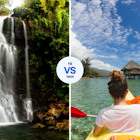
Jun 28, 2023 • 6 min read

Feb 18, 2022 • 6 min read

Jul 30, 2020 • 9 min read

Dec 11, 2019 • 5 min read
- Travel Advisories |
- Contact Us |
- MyTravelGov |
Find U.S. Embassies & Consulates
Travel.state.gov, congressional liaison, special issuance agency, u.s. passports, international travel, intercountry adoption, international parental child abduction, records and authentications, popular links, travel advisories, mytravelgov, stay connected, legal resources, legal information, info for u.s. law enforcement, replace or certify documents.
Share this page:
Fiji Travel Advisory
Travel advisory august 9, 2023, fiji - level 1: exercise normal precautions.
Reissued with updates to health information and Level 2 area.
Exercise normal precautions in Fiji. Some areas have increased risks. Read the entire Travel Advisory.
Read the country information page for additional information on travel to Fiji.
If you decide to travel to Fiji:
- Enroll in the Smart Traveler Enrollment Program ( STEP ) to receive security messages and make it easier to locate you in an emergency.
- Follow the Department of State on Facebook and Twitter.
- Review the Country Security Report for Fiji.
- Visit the CDC page for the latest Travel Health Information related to your travel.
- Prepare a contingency plan for emergency situations. Review the Traveler’s Checklist .
Colo I Suva Forest Park - Level 2: Exercise Increased Caution
Crime along the trails, particularly phone and bag snatchings, occurs frequently in areas where foreigners gather; resistance can result in injury. Be aware of your surroundings at all times and to be extra vigilant when displaying items like jewelry, bags and cell phones in public.
Do not physically resist any robbery attempt. Use caution when walking or driving at night.
Travel Advisory Levels
Assistance for u.s. citizens, search for travel advisories, external link.
You are about to leave travel.state.gov for an external website that is not maintained by the U.S. Department of State.
Links to external websites are provided as a convenience and should not be construed as an endorsement by the U.S. Department of State of the views or products contained therein. If you wish to remain on travel.state.gov, click the "cancel" message.
You are about to visit:

Traveling Smartly
Digital Travel & Tourism Guide
- Adventure Travel
- Backpackers
- Business Travel
- Leisure Travel
- Senior Travel
- Solo Travel
- Recreation Activities
- North America Travel
- Europe Travel
- Middle East Travel
- Asia Travel
- Oceania Travel
- Africa Travel
- Finance & Technology
- Write for Us
Traveling Smartly | Destination Guide | Travel Safety Tips
🇫🇯 Unravel Fiji’s Secrets: Your Ultimate Country Information and Traveler’s Guide! 🌊✈️
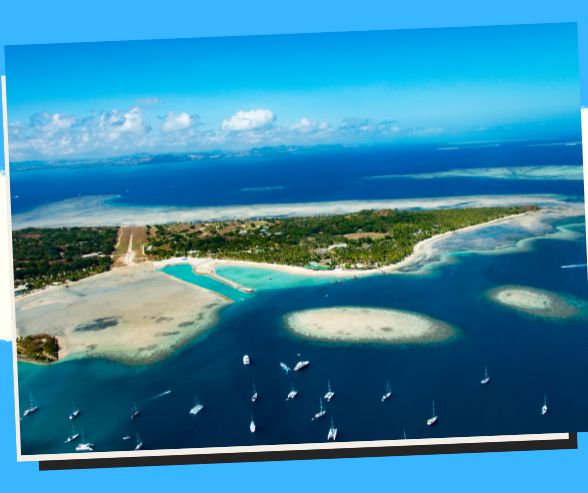
🌊✈️ Ready to uncover Fiji’s best-kept secrets? Our comprehensive country information and traveler’s guide will lead you to pristine beaches, hidden waterfalls, and captivating cultural experiences. Embrace the allure of Fiji with us! 🏝️🌴
I. Introduction to Fiji 🇫🇯
Table of Contents
Fiji is a captivating island nation nestled in the South Pacific Ocean. With its azure waters, lush landscapes, and warm hospitality, Fiji is a paradise for travelers seeking a tropical getaway.
Unique Features and Attractions
Fiji boasts many unique features, including stunning coral reefs, vibrant marine life, and a diverse culture that reflects the blend of indigenous Fijian traditions and Indian influences.
Why Visit Fiji? 🌟
From the pristine beaches and world-class diving spots to the warm smiles of the locals, Fiji offers a perfect mix of relaxation and adventure. Whether you seek underwater escapades, cultural experiences, or a tranquil retreat, Fiji has something for everyone.
II. Fiji Geographical Overview
Location and Borders
Fiji is an archipelago of more than 330 islands, with Viti Levu and Vanua Levu being the two largest islands. In the South Pacific Ocean, Fiji is northeast of New Zealand and approximately 1,300 miles (2,100 kilometers) northeast of Sydney, Australia.
Climate and Seasons 🌞🌧️
Fiji enjoys a tropical climate with warm temperatures year-round. From May to October, the dry season offers cooler temperatures and less rainfall, making it an ideal time for outdoor activities. From November to April, the wet season brings higher humidity and occasional tropical storms.
Topography and Landscapes
Fiji’s landscapes are diverse, ranging from lush rainforests to white sandy beaches and majestic mountains. The islands are surrounded by coral reefs, making them perfect for snorkeling and scuba diving.
III. Fiji History and Culture
Historical Background
Fiji’s history is rich and complex, with early settlement by the indigenous Fijians and later arrivals of Polynesians and Melanesians. In the 19th century, Fiji became a British colony before gaining independence in 1970.
Key Events and Milestones
Significant events, including the arrival of European explorers, the establishment of the first Indian settlements, and the end of British colonial rule, punctuate Fiji’s history.
Cultural Heritage and Traditions
Fiji’s culture is deeply rooted in its indigenous heritage, and traditional customs, rituals, and storytelling remain integral to daily life. The fusion of Fijian and Indian cultures has also given rise to unique traditions and festivals.
IV. Fiji’s Top Tourist Destinations
Description of the Most Popular Cities/Regions
Nadi, located on the west coast of Viti Levu, is a bustling hub and the main gateway for international visitors. Suva, the capital city, offers a mix of modernity and cultural experiences.
Highlighted Attractions and Landmarks
The Mamanuca and Yasawa Islands boast some of Fiji’s most picturesque beaches and luxury resorts. The Sigatoka Sand Dunes National Park and the Sleeping Giant Garden are popular attractions.
Must-Visit Places and Hidden Gems
Taveuni, known as the “Garden Island,” is a hidden gem with lush rainforests, waterfalls, and abundant marine life. The remote Lau Group of islands offers a glimpse into traditional Fijian life and customs.

V. Fiji Outdoor Activities and Natural Wonders
National Parks and Wildlife Reserves
Koroyanitu National Heritage Park and Bouma National Heritage Park provide hiking and wildlife spotting opportunities, showcasing Fiji’s diverse ecosystems.
Hiking, Trekking, and Adventure Sports
Trek to the summit of Mount Tomanivi on Viti Levu for breathtaking views, or explore the waterfalls and caves in the Nausori Highlands.
Beaches, Lakes, and Water Activities
Fiji’s beaches are postcard-perfect, offering swimming, snorkeling, and kayaking opportunities. For more adventurous travelers, diving and surfing are also popular activities.
VI. Fiji Food and Cuisine
Traditional Dishes and Local Specialties
Fijian cuisine is a delightful blend of fresh seafood, tropical fruits, and indigenous vegetables. Don’t miss “Kokoda,” a Fijian ceviche, and “Lovo,” a feast cooked in an underground oven.
Popular Street Food and Restaurants
Sample Indian-inspired treats such as “Roti” and “Curry” from street vendors, or savor international and gourmet fare at beachfront restaurants.
Culinary Festivals and Events
If you visit during Fiji’s Food and Rum Festival, you’ll have the opportunity to indulge in the best of Fijian cuisine and enjoy the lively atmosphere.
VII. Fiji Art, Architecture, and Museums
Notable Architectural Landmarks
Explore the Sri Siva Subramaniya Temple, the largest Hindu temple in the Southern Hemisphere, and the grand Government Building in Suva.
Art Galleries and Museums
Visit the Fiji Museum to learn about the country’s history and cultural heritage through fascinating exhibits and artifacts.
Cultural Festivals and Performances
Experience the vibrant colors and rhythmic dances of traditional Fijian performances, which are often part of cultural festivals and celebrations.
VIII. Fiji Shopping and Souvenirs
Popular Local Markets and Shopping Districts
Visit the Suva Municipal Market for a vibrant shopping experience, where you can find fresh produce, handicrafts, and souvenirs.
Traditional Crafts and Products
Purchase handwoven mats, carved wooden artifacts, and traditional pottery as mementos of your Fiji journey.
Unique Souvenirs to Bring Back Home
Local handicrafts, such as Fijian Tapa cloth and “Masi” designs, make for distinctive and meaningful souvenirs.
IX. Fiji Practical Information
Visa Requirements and Entry Regulations
Ensure you have a valid passport and check the visa requirements for your nationality before traveling to Fiji.
Currency and Exchange Rates 💱💳
The Fijian Dollar (FJD) is the official currency. Money can be exchanged at banks and currency exchange offices.
Transportation Options Within Fiji 🚇🚍✈️
Taxis, buses, and domestic flights are the primary modes of transportation for getting around Fiji’s islands.
X. Fiji Accommodation Options
Hotels, Resorts, and Guesthouses
Fiji offers many accommodations, from luxury resorts with overwater bungalows to cozy guesthouses and boutique hotels.
Budget-Friendly Options and Alternative Accommodations
For budget travelers, hostels and backpacker lodges provide affordable lodging options.
Unique and Luxury Accommodations
Experience ultimate luxury with private island resorts and beachfront villas, offering secluded escapes and world-class amenities.
XI. Fiji Safety and Travel Tips
Health and Safety Considerations
Check for any required vaccinations and take necessary precautions against mosquito-borne illnesses.
Local Customs and Etiquette
Fijians are warm and welcoming, so reciprocate their friendliness with a friendly “Bula!” greeting and respectful behavior.
Useful Phrases and Language Tips 🗣️📞
Learn a few Fijian phrases to enhance your interactions with the locals and immerse yourself in the culture.
XII. Fiji Festivals and Events
Major Cultural and Religious Festivals
Celebrate Fiji Day, Diwali, and the Hibiscus Festival, among other festivals that showcase the nation’s diverse cultural tapestry.
Sporting Events and Celebrations
Experience the passion of rugby, Fiji’s national sport, during matches and tournaments.
Seasonal Events and Carnivals
Join in the festivities during the Bula Festival or the Sugar Festival, celebrating Fiji’s sugar cane industry.
XIII. Fiji Sustainability and Responsible Tourism
Ecotourism Initiatives and Conservation Efforts
Support organizations and tours that prioritize sustainability and contribute to the protection of Fiji’s natural resources.
Responsible Travel Practices
Practice responsible tourism by respecting wildlife and local customs and minimizing your environmental footprint.
Tips for Reducing Your Environmental Impact
Opt for eco-friendly accommodations, avoid single-use plastics, and participate in local conservation efforts.
XIV. Conclusion
Recap of the Fiji Highlights
Fiji’s stunning landscapes, vibrant culture, and warm hospitality make it a dream destination for travelers.
Final Thoughts and Recommendations
Take the time to explore Fiji’s diverse islands and immerse yourself in its unique blend of cultures.
Encouragement to Explore and Enjoy Fiji
From serene beaches to thrilling adventures, Fiji has endless experiences awaiting you. Embrace the magic of the islands and create cherished memories that will last a lifetime. Happy travels!
Essential tips for Fiji travel Must-know travel tips for Fiji Fiji’s hidden gems exploration Whale-watching in Fiji Fiji’s island paradise adventure Culinary delights in Fiji Embracing Fijian culture Top destinations in Fiji Fiji’s eco-friendly experiences Shopping in Fiji’s markets
Please be advised that the information presented here is subject to change, and it is highly recommended to consult local authorities for the latest and most accurate updates.
If you are interested in showcasing your travel and leisure services, including travel agents, tour operators, and booking agents, as well as featuring games and gaming activities, sports and recreation opportunities, delightful food and dining experiences, and reliable car rental and transportation services, please don’t hesitate to email us . We help promote your offerings and ensure a memorable travel experience.
- Fiji adventure
- Fiji country information
- Fiji culture
- Fiji eco-adventures
- Fiji island paradise
- Fiji shopping
- Fiji sustainable travel
- Fiji top destinations
- Fiji travelers guide
- Fiji whales
Share this article
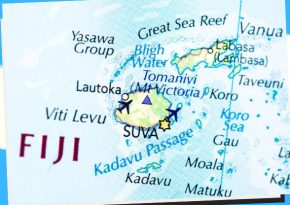
✈️ Fiji Unplugged: 20 Essential Tips Before Your Dream Vacation! 🏝️
🗺️🏝️ Dreaming of Fiji’s paradise? Prepare for an epic adventure […]
Comments (0)
Leave a reply cancel reply.
Your email address will not be published. Required fields are marked *
Save my name, email, and website in this browser for the next time I comment.
Please enter an answer in digits: seven + two =

Fiji Travel Guide
Last Updated: August 14, 2024
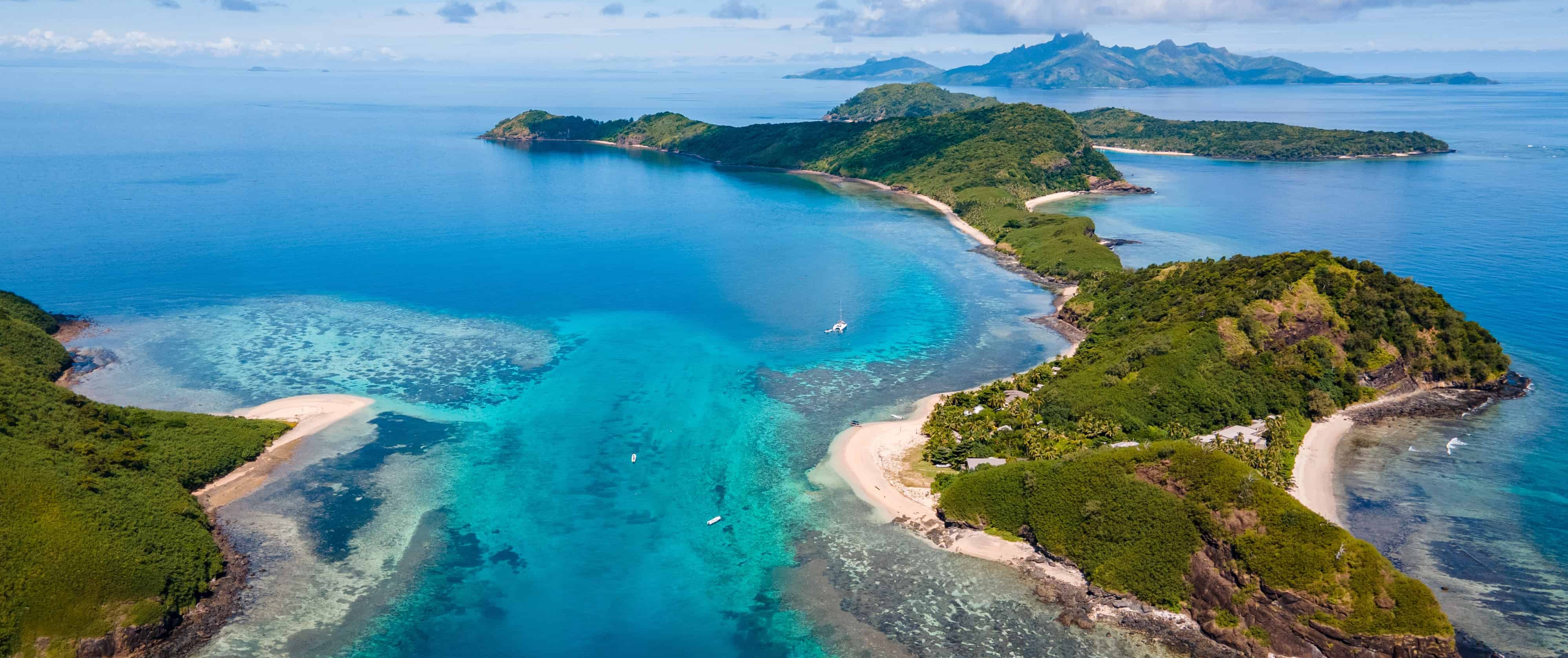
Fiji is a collection of islands spanning over 1,600 kilometers in the South Pacific Ocean. There are two main islands, Viti Levu and Vanua Levu, and nearly 900 smaller islands and inlets.
Settled thousands of years ago by Austronesian peoples, Europeans made landfall in 1643 when Dutch explorer Abel Tasman “discovered” the islands. Over 100 years later, British explorer James Cook arrived and by 1874 the islands were annexed and made into a Crown colony by the British. This lasted until 1970 when Fiji regained its independence.
Though famous for expensive bottled water and fancy resorts, a vacation here doesn’t need to break the bank. Inexpensive accommodation and food, combined with the fact most Pacific flights include a stopover here, makes the islands an affordable place to visit (I found Fiji way more affordable than I thought it would be when I first visited).
This travel guide to Fiji can help you plan your trip, save money, and make the most out of your time in this tropical paradise!
Table of Contents
- Things to See and Do
- How to Stay Safe
- Where to Stay
- Typical Costs
- Suggested Budget
- Money-Saving Tips
- How to Get Around
- Best Places to Book Your Trip
- Related Blogs on Fiji
Click Here for City Guides
Top 5 things to see and do in fiji.
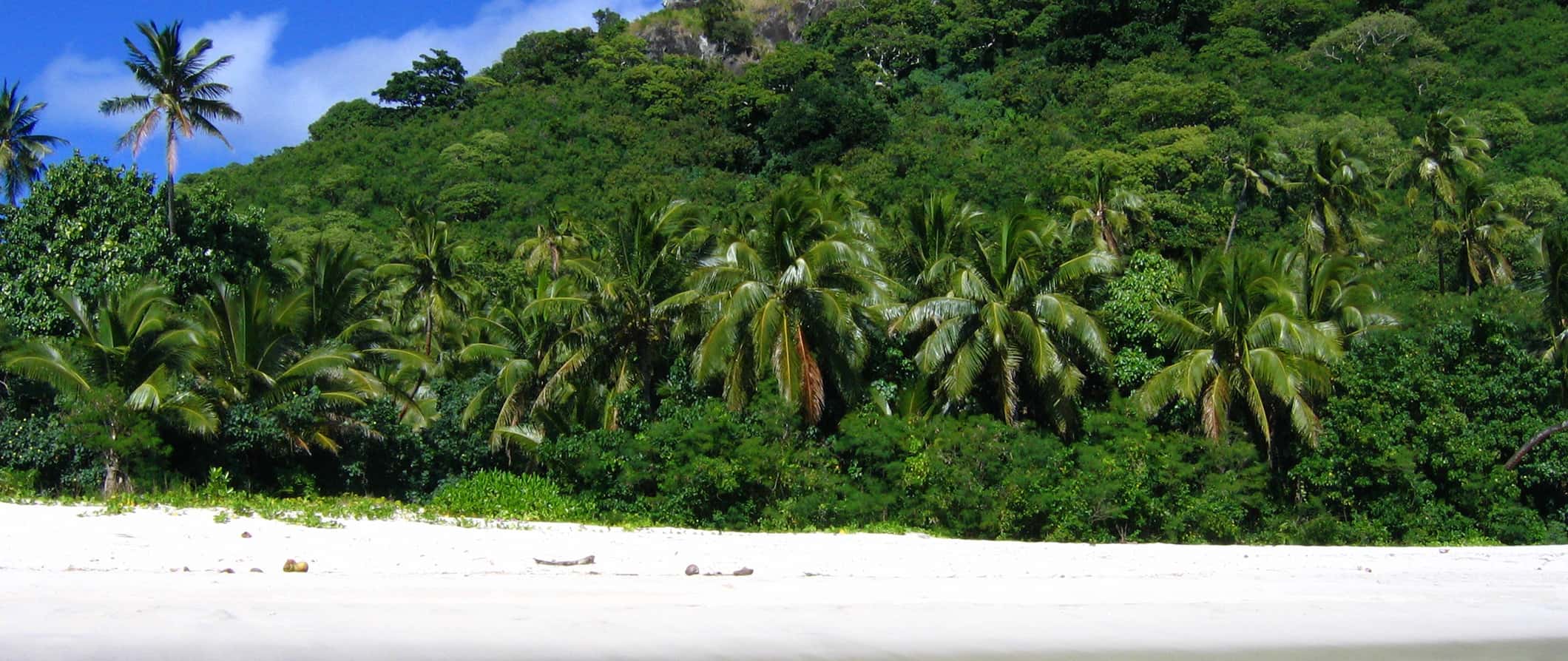
1. Explore the Mamanucas
The Mamanucas are a group of around 20 islands, popular with watersport enthusiasts keen to try jet skiing, kayaking, kiteboarding, SUP, and surfing. Most people visit on a day trip via high speed catamarans from Port Denarau or via water taxis and traditional sailing boats from Vuda Marina. Once here, they enjoy stops at deserted islands, as well as diving and snorkeling trips, exploring incredible marine life, soft coral gardens, shipwrecks and clear lagoons. I recommend staying overnight as these islands are at their most peaceful once the daytrippers have left!
2. Visit Suva
Situated on the island of Viti Levu, Suva is the capital of Fiji. Head to the municipal market between Thursday and Saturday to pick up souvenirs and inexpensive food, which becomes even cheaper later in the day. Stop by the peaceful Thurston Gardens to see its historical fig trees and colonial-era plant life as well as native tropical plants. Named after Fiji’s fifth Governor, Sir John Bates Thurston, they occupy the site where the original town was built and burned down in the 1840s. If you’re here in July or August, visit the Mariamma Temple to witness the fire-walking festival, a Hindu ritual that takes place during the full moon and started on Beqa Island 500 years ago. Fijians spend hours preparing the firepits and the fire-walking itself is an amazing spectacle, if you can bear to watch!
3. See the Fiji Museum
This museum detailing South Pacific culture and Fiji’s history is one of Suva’s best attractions. You’ll find Indian art exhibits, HMS Bounty relics, and artifacts that showcase traditional Fijian life, such as cannibal forks, shell jewelry, and tribal weaponry. A new exhibition called Voyages: Stories of an Ocean People tells the story of Fiji’s rich maritime history. It’s part of a research project and offers insight into native people’s longstanding relationship with the ocean. Open daily. The museum isn’t that large and only takes a few hours to see. Admission is 10 FJD.
4. Explore the Yasawas Islands
The Yasawa Islands are a pretty archipelago of 20 volcanic islands. They’re also where the 1960s film ‘The Blue Lagoon’ was mostly filmed and were closed to tourists until the late 1980s. These days, people live on these gorgeous islands and they’re popular with budget travelers for their inexpensive accommodation, cheap transportation, and late-night parties.’ Most of the islands here just have one resort and you can book it on the way as you hop between islands. If you’re looking to party, the best island for that is Beachcomer. If you’re traveling between the islands, Id also highly recommend buying the Bula Pass when you get here. It’s a hop-on-hop-off boat pass that allows you to explore the islands in 5, 7, 9 11 or 13 days.
5. Go diving
I learned to dive in Fiji and it was one of the most incredible things I’ve ever done. The visibility is fantastic, with depths of up to 40 meters (131 feet) and even though I was nervous to swim beside sharks at first, it’s one of the best things you can ever do. You can dive pretty much anywhere in the country. Famous dive spots include Astrolabe Reef, Beqa Lagoon, and Rainbow Reef. Expect to pay from 295 FJD per trip.
Other Things to See and Do in Fiji
1. explore bouma national heritage park.
This national park, located on the north of Taveuni Island, is among the top attractions in the country. Taveuni is often nicknamed the ‘Garden Island’ and much of that is thanks to this serene and beautiful park where you’ll find the country’s legendary national flower, the Tagimaucia. The park is home to the island’s highest peak known as Uluinggalau Mountain and is covered in waterfalls plunging into deep pools perfect for swimming, with coastal forest trails ideal for hiking. The picturesque Tavoro Waterfalls are near the visitor center but if you want to do more strenuous trekking, do the Vidawa Rainforest Trail. It’s a half-day guided hike (you must take a tour) that ends at the waterfalls. It’s led by shamans who share the natural history of the park. It’s around 130 FJD for the tour, but if you just want to visit the park, there’s an entrance fee of around 30-40 FJD and an extra 40 FJD to visit the Vidawa Rainforest and 8 FJD to enter the Tavoro Falls. The Lavena Coastal Walk is 8 FJD without a tour guide.
2. Visit Koroyanitu National Heritage Park
This is another ideal place for hiking. You can climb up Castle Rock for a bird’s eye view over the Mamanucas and Yasawa Islands (it’s a challenging four-hour hike one-way). There’s also a two-hour hike that takes you past a giant waterfall and to the Navuratu village. There are six eco-friendly villages inside the park and the locals maintain the trails and the landscape (you can visit the villages). The fittest hikers can also take a separate guided tour to Mount Batilamu, from Abaca village, for views over the Nadi valley. It takes around three hours one-way. Admission to the park is 25 FJD.
3. Go whitewater rafting
For an adrenaline-packed day, go white-water rafting on the Upper Navua River. It winds through the highlands of Viti Levu, offering waterfalls and all grades of rapids that are perfect for beginners and seasoned pros. Many people combine whitewater rafting with kayaking along the rivers and mangroves. This trip is expensive at around 480 FJD per person, but it makes for a fun day trip and offers the chance to see hidden grottoes, amazing canyons and unspoilt rainforest home to fruit bats and native birdlife.
4. Visit the old capital of Levuka
Fiji’s original capital, Levuka (founded in 1820), is on the island of Ovalau. The small town, home to just 1,100 people, has largely escaped the influx of tourism and has been designated a UNESCO World Heritage Site for its preservation as a late colonial Pacific port town (by the 1870s, it was the region’s most important trading post). There’s a small community museum, but other than that, there’s not much to do other than enjoy the quiet atmosphere, the architecture, and the surrounding scenic mountains.
5. Go surfing
Fiji offers some of the world’s best surfing with countless famous sites like Lighthouse Rights and the six-metre-high Cloudbreak, dubbed one of the top five waves in the world. The breaks here aren’t ideal for beginners, but there are calmer waters at Sigatoka. Head to the Mamanuca islands for top waves like Wilkes, Tavarua Rights and Namotu Lefts, or try out windsurfing and kitesurfing as a bonus. Namotu Island is home to a popular surf spot called Swimming Pools and offers kitesurfing hire for about 680 FJD while Malolo Island Resort offers free windsurfing for staying guests. Expect to pay about 95 FJD for a three-hour surf lesson.
6. Visit the Garden of the Sleeping Giant
Originally the garden of actor Raymond Burr (he starred in the TV shows Perry Mason and Ironside in the 1950s-70s), the Sleeping Giant covers over 50 acres of land and is filled with exotic plants and tropical flowers, including up to 40 different varieties of orchids. A jungle walk takes you past a huge lily pond and through native forest. It’s located at the base of Nadi’s Sabeto Mountains where one of the peaks resembles, you guessed it, a sleeping man. Admission is 18 FJD.
7. Try kava
Kava, which is made from a root with the same name, is the drink of choice in Fiji. Some people call it yaqona, or just ‘grog’, and it causes a numbing sensation on the lips and mouth and relaxes you. Make sure you go “high tide” and get the big cup! One of the best ways to experience kava is to participate in a village ceremony (it involves sitting on the floor and following some rituals as you drink). Some tours include this, but they’re usually full-day tours starting from about 300 FJD. If you’re on a budget, it’s best to just find some locals and drink with them!
8. Hike Colo-i-Suva Forest Park
This rainforest park is small, but offers a quiet retreat from Suva’s busy streets. Plus, it’s really easy to get to: just take the Sawani bus from Suva city bus station. When you visit, you’ll notice it brims with tropical plants like the Masiratu flower (which appears on the Fijian $5 note) and native birds who fill the forest with their birdsong. Pick up a bird guide at the visitor centre and tick off native bird species like the scarlet robin, golden whistler, sulphur-breasted musk parrot and maybe even the Fiji warbler, which lives in the undergrowth. Look up to spot the Fiji Goshawk – a bird you won’t find in any other country and There are about 7 kilometers (4 miles) of hiking trails leading to several natural pools on Waisila Creek that make refreshing swimming holes and a 5-kilometre natural trail has been built with signs that tell you about the native plants. Admission is 10 FJD per person and it’s open daily from 8am to 4.30pm.
9. Visit Sri Siva Subramaniya Swami Temple
This is the largest Hindu temple in the Pacific and can be found at the base of Main Street in Nadi. You’ll see traditional Dravidian architecture here, with wooden carvings of deities from India as well as incredibly colorful ceiling paintings. Be sure to cover your knees and shoulders and leave your shoes at the door. There’s the option for guided tours inside. Admission is 5 FJD.
6. Visit Sigatoka Sand Dunes National Park
Located on Viti Levu, this was Fiji’s first national park. Many people refer to the sand dunes here as one of the country’s top natural wonders. They have historical importance too, as many artefacts such as pottery and primitive tools have been found here – some are now on display at the Fiji Museum. As 2,600-year-old human remains were excavated here, it’s also believed it was once part of a burial site. Entrance to the park is 10 FJD and if you’re feeling fit, pick up a map from the visitor center and take the one-hour or two-hour trek around the dunes. There’s also the option of taking a guide. Access to the dunes is sign-posted from Queens Road, just before you reach Sigatoka town.
7. Take a river safari
At nearly 75 miles (120km) long, the Sigatoka River is Fiji’s largest waterway and it wends its way from Mount Victoria to the Pacific Ocean, opposite Sigatoka’s dunes. Book a half day eco-excursion with Sigatoka River Safari and a high-speed jet boat will whisk you along its waters, past rainforest-covered peaks and traditional villages. Guides fill you in on the island’s culture, including its historical cannibal traditions and the boat stops by local communities. You can visit a traditional Chief’s bure (house), try local food and learn some traditional Fijian dancing. Prices start from 299 FJD so it’s not cheap but is one of the best ways to see Fiji’s rainforest-filled interior.
How to Stay Safe in Fiji
Fiji is relatively safe. This is a relaxed island nation with little to worry about while you’re here. Like any destination, your biggest concern is opportunistic and petty crime like pickpocketing. With that in mind, leave your valuables at home and keep an eye on your belongings at all times, especially while at the beach and in busy areas. Credit card fraud and ATM card skimming also occurs here, so be extra cautious when using ATMs and check your bank account regularly.
Occasionally there may be street rallies and protests which could turn violent so steer clear of these and keep up to date with local political news where possible.
Men are often approached by locals trying to sell sex workers or marijuana. Both are illegal, so politely decline and walk away.
Solo female travelers should feel safe here (I’ve met a lot while visiting here), though take the standard precautions while you’re here (don’t leave your drink unattended when out at the bar, don’t walk home alone at night if intoxicated, etc.) Check out one of the many solo female travel blogs on the web for more specific information.
Cyclone season in the Pacific runs from October to May, so keep an eye on the forecast and make alternative travel plans if necessary. Make sure you have travel insurance if you visit during this time.
Scams here are rare, but if you’re worried about getting ripped off you can read about common travel scams here .
If you experience an emergency, dial 911 for assistance.
Always trust your gut instinct. Make copies of your personal documents, including your passport and ID.
The most important piece of advice I can offer is to purchase good travel insurance. Travel insurance will protect you against illness, injury, theft, and cancellations. It’s comprehensive protection in case anything goes wrong. I never go on a trip without it as I’ve had to use it many times in the past. You can use the widget below to find the policy right for you:
Where to Stay in Fiji
There are lots of budget accommodations in Fiji. All the islands are different and there are so many islands that I can’t list everything here. As long as you don’t stay at the resorts, you’ll find something affordable! Here are my recommended places to stay in Fiji:
- The Beachouse (Coral Coast)
- Barefoot Manta Island (Yasawa Islands)
- Barefoot Kuata Island (Yasawa Islands)
- Smugglers Cove Beach Resort (Nadi)
- Bamboo Beach (Nadi)
Fiji Travel Costs
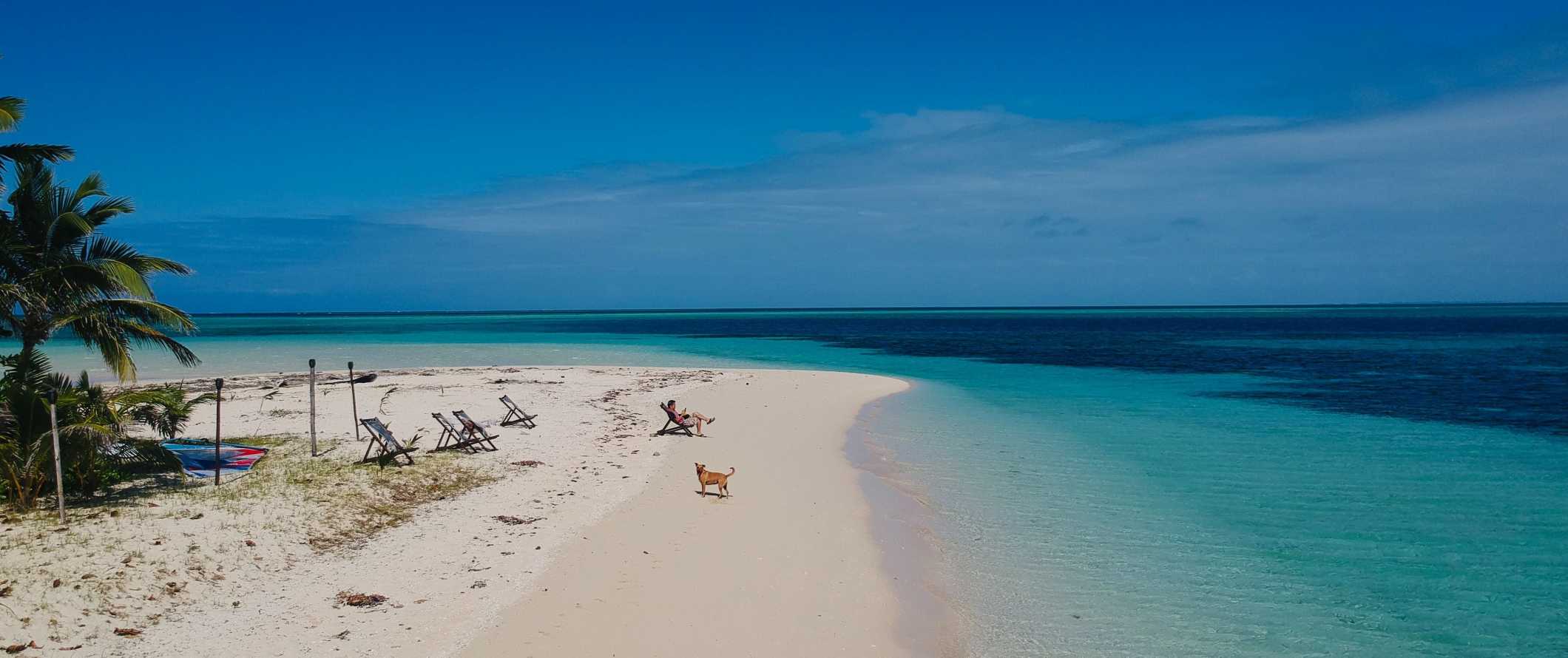
Activities – Most museums and attractions cost 10-20 FJD. Diving trips cost 295 FJD while white-water rafting is around 480 FJD for a day trip. Surf lessons cost around 200 FJD. Village tours (including kava ceremonies) cost around 370 FJD.
Accommodation
- Hostel Dorms – 35-55 FJD per night
- Hostel private rooms – 85-125 FJD per night
- Budget hotels – start at 135 FJD per night
- Homestays – start at 20 FJD per night
- Airbnb private rooms – 48-85 FJD per night
- Airbnb apartments – 170-290 FJD per night
- Street food – 5-10 FJD
- Buffets – 65-85 FJD
- Sit-down restaurants – 40-55 FJD
- High-end dining – 65-80 FJD per person
- Four-course meal – 200-300 FJD
- Beer – 6.50 FJD
- Groceries for a week – 65-110 FJD
Fiji Suggested Budgets
Backpacker – 105 fjd per day.
This budget covers a hostel dorm, using public transportation to get around, cooking your meals and eating some street food. You’ll need to limit your drinking and do mostly free and cheap activities like hiking and swimming.
Midrange – 220 FJD Per Day
A mid-range budget covers staying in a private Airbnb room, eating out for most meals, enjoying a few drinks, and taking the occasional taxi to get around. This leaves room to enjoy some paid activities (diving, museums visits).
Upscale – 470 FJD Per Day
On this budget, you can stay in a hotel, eat out for all your meals, drink more, island-hop, rent a car, and do all the tours and activities you want.
Fiji Travel Guide: Money-Saving Tips
If you stick to free and cheap things to do in Fiji (like hiking and going to the beach), you can visit for very little money without missing out on much. For everything else, here are some ways to save money in Fiji:
- Use “share taxis” – As the name suggests, these taxis pick up as many passengers as possible and charge the same as a bus fare, which is a good option for longer journeys.
- Eat at snack stands – The cheapest food in Fiji is found on the snack stands dotting the roads. You can pick up curry or fish and chips for as little as 3 FJD.
- BYO Everything – If you are going to the outer islands, bring as much as possible. Things are about 50% cheaper on the main island so save money and buy water, snacks, and alcohol ahead of time.
- Book a driver – If you can round up a few people, hire a driver for a full day. It should cost about 100 FJD if you haggle, and it’s a LOT cheaper than taking taxis everywhere or getting a rental car (if you’re short on time and do not want to use public transportation everywhere).
- Pack a water bottle – The tap water on the main islands is generally safe to drink, though I would bring a waterbottle with a filter just in case. My preferred bottle is LifeStraw . It ensures your water is clean and safe while helping you avoid single-use plastic.
- Use public transport – Although taxis are pretty reasonable, consider taking a local bus on the main islands. There are two types: the local bus, which has open windows and will take you between major towns and cities, and the express bus, which is more like a coach (and normally has air-conditioning) and runs between Nadi and Suva. Make sure you have local cash for your fare – most people just buy their ticket when boarding.
How to Get Around in Fiji
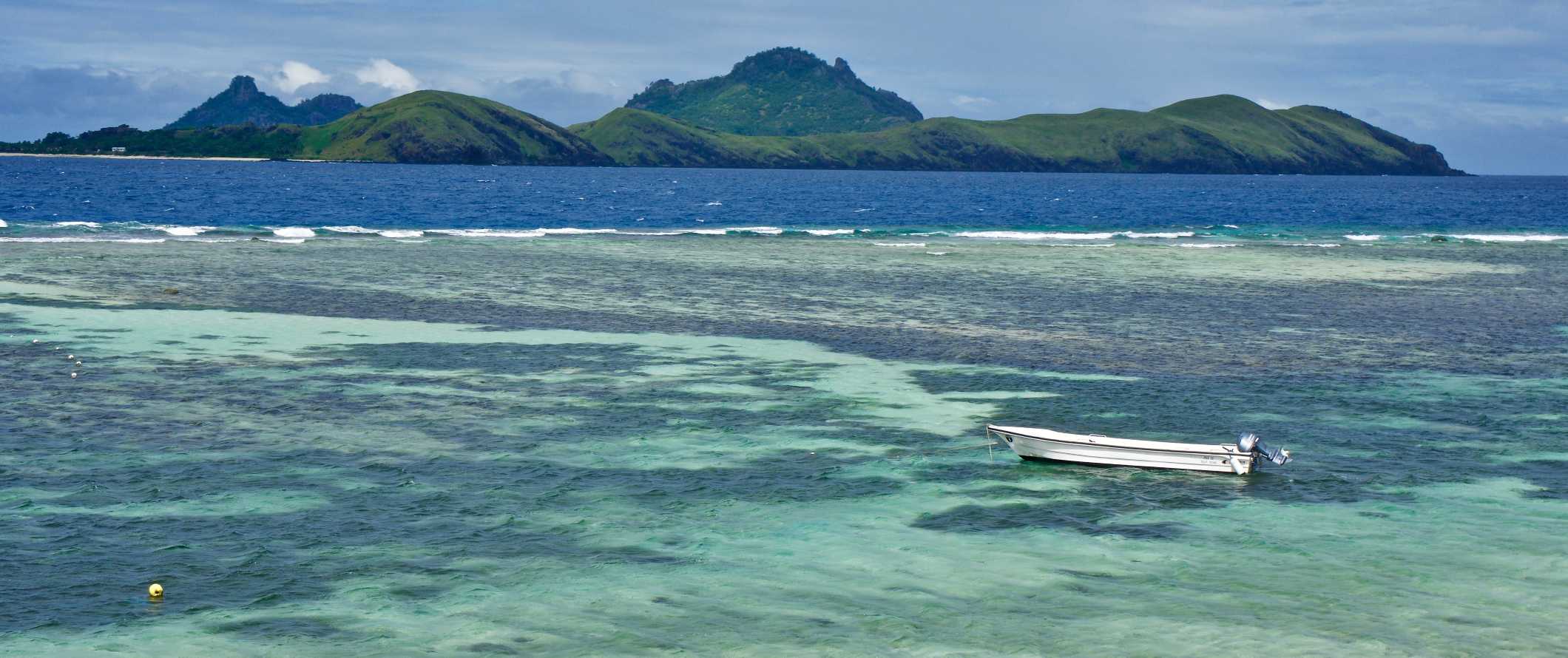
Bus – Buses are efficient and inexpensive in Fiji, with bus services provided by Coral Sun, Sunbeam, and Pacific Transport. The 4-hour journey from Suva to Nadi on the main island costs between 7-20 FJD, depending on the date and time. A bus between Suva and Naviti costs about the same.
On the smaller islands, you can show up at a bus stop and flag down a bus. Any journey shouldn’t cost more than a few dollars. Mini-buses and converted trucks are abundant!
Ferry – Ferries run between the islands of Viti Levu and Vanua Levu, Ovalau and Kadavu, and Vanua Levu and Tavaeuni. Each island has many different routes, often with multiple journeys each day. Fares start from about 16 FJD.
Some of the main ferries are:
- Bligh Water Shipping
- Goundar Shipping
- Patterson Brothers Shipping
Not many services go to the Outer Islands, and the boats that do are slow and unreliable. Some islands only receive a ferry arrival once a month! Goundar Shipping visits Vanuabalavu, Cicia, and Rotuma, but you’ll have to call ahead to check the schedule.
Additionally, you can get an inter-island ferry pass (called a Bula Pass) for the Yasawa Islands that costs around 458 FJD for five days. Longer passes are also available:
- 7-8 days for 603 FJD
- 9-10 days for 696 FJD
- 11 days for 773 FJD
- 13 days for 824 FJD
- 15 days for 870 FJD
Note that the ferry pass company prices their passes in USD so these currency conversions will fluctuate.
Flying – To get between islands, the easiest way is to fly. Flights are surprisingly cheap too. A 30-minute flight between Nadi and Suva costs as little as 140 FJD. Suva to Koro Island is about 190 FJD and takes 35 minutes. Nadi to Cicia Island is about 325 FJD and takes nearly four hours.
Taxis – A taxi around Suva costs around 10 FJD. Outside of Suva, taxis tend to be unmetered, and you should negotiate your fare before you get in.
Car Rental – Renting a car is not cheap, costing around 120 FJD per day for a multi-day rental. Unless you are splitting it with friends, I’d skip the rental. Drivers need to be at least 21 years of age.
Hitchhiking – Hitchhiking here is relatively easy and safe, though rides are only really common near the larger towns and cities. Expect long waits the further away from the capital you travel. For more tips and info, check out Hitchwiki .
When to Go to Fiji
Fiji has more than one peak season and is considered a year-round destination. Even though November to April is monsoon season here, December and January are very busy as Australians and Kiwis flock to the islands during their school holidays. July is another popular time to visit for great temperatures, but expect higher prices for accommodations. In December, the average daily high is 31°C (88°F), while it’s around 28°C (82°F) in July.
The low season is in November and then February-April. Both periods occur during Fiji’s wet season, with lots of rain and high humidity. It can be uncomfortable, but prices tend to be lower.
I recommend hitting up Fiji during the shoulder season, from May-June or August-October. The temperatures are still warm, there’s less rainfall, and there’s a low risk of cyclones (October-May is cyclone season in the Pacific). It’s still hot during this time, with the average daily temperature in May being 29°C (84°F)!
Fiji Travel Guide: The Best Booking Resources
These are my favorite companies to use when I travel. They consistently have the best deals, offer world-class customer service and great value, and overall, are better than their competitors. They are the companies I use the most and are always the starting point in my search for travel deals.
- Skyscanner – Skyscanner is my favorite flight search engine. They search small websites and budget airlines that larger search sites tend to miss. They are hands down the number one place to start.
- Hostelworld – This is the best hostel accommodation site out there with the largest inventory, best search interface, and widest availability.
- Booking.com – The best all around booking site that constantly provides the cheapest and lowest rates. They have the widest selection of budget accommodation. In all my tests, they’ve always had the cheapest rates out of all the booking websites.
- Get Your Guide – Get Your Guide is a huge online marketplace for tours and excursions. They have tons of tour options available in cities all around the world, including everything from cooking classes, walking tours, street art lessons, and more!
- SafetyWing – Safety Wing offers convenient and affordable plans tailored to digital nomads and long-term travelers. They have cheap monthly plans, great customer service, and an easy-to-use claims process that makes it perfect for those on the road.
- LifeStraw – My go-to company for reusable water bottles with built-in filters so you can ensure your drinking water is always clean and safe.
- Unbound Merino – They make lightweight, durable, easy-to-clean travel clothing.
- Top Travel Credit Cards – Points are the best way to cut down travel expenses. Here’s my favorite point earning credit cards so you can get free travel!
Fiji Travel Guide: Related Articles
Want more tips for your trip? Check out all the articles I’ve written on Fiji travel and continue planning your trip:
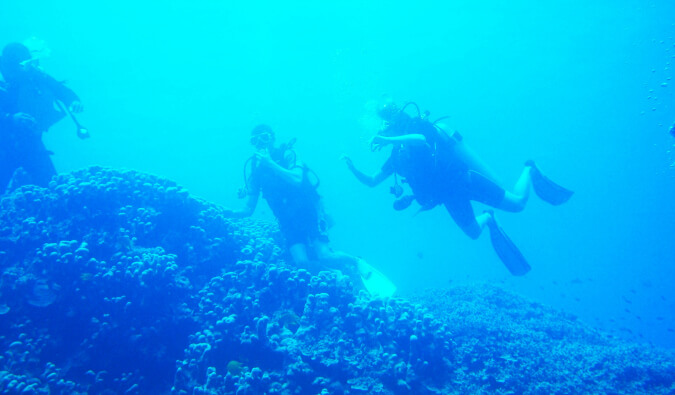
Learning How to Scuba Dive in Fiji
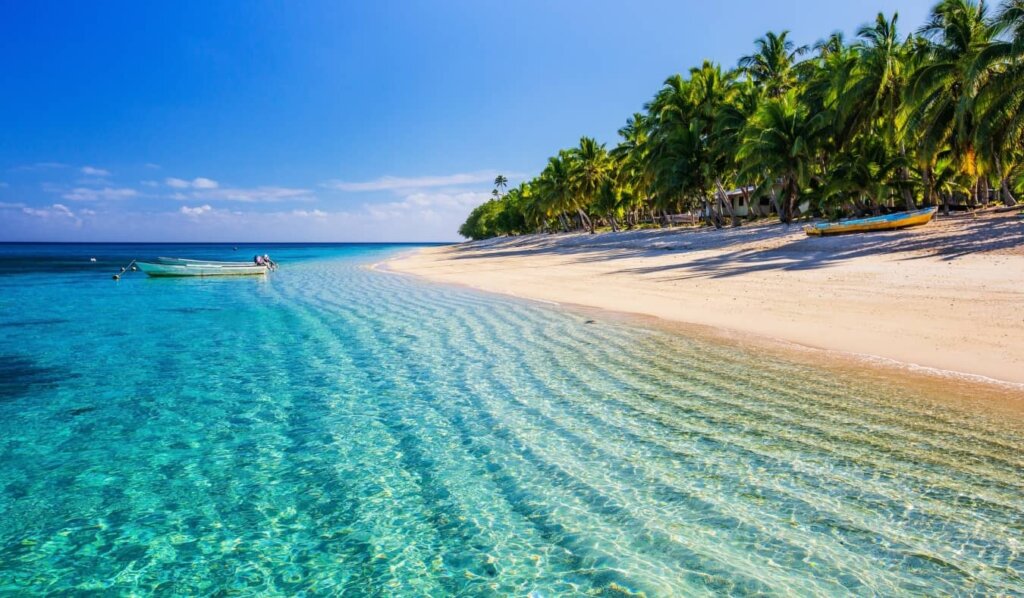
Trapped in Paradise: A Trip to Fiji
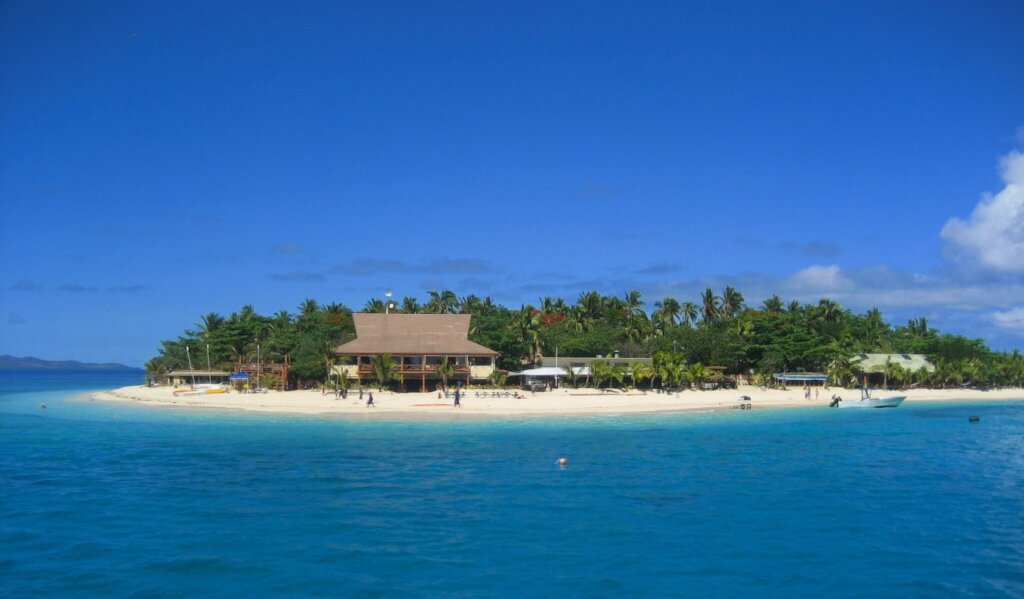
The 20 Best Tropical Islands in the World
Get your free travel starter kit.
Enter your email and get planning cheatsheets including a step by step checklist, packing list, tips cheat sheet, and more so you can plan like a pro!

- Where To Stay
- Transportation
- Booking Resources
- Related Blogs
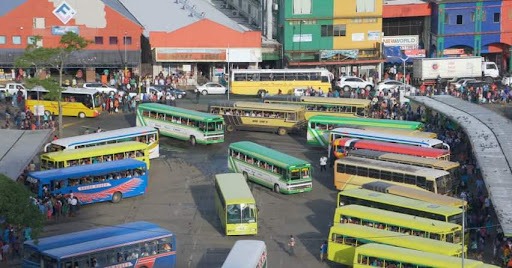
Useful travel tips for Fiji travellers: transport edition
Travelling in a new country can be as thrilling as it is frustrating. The latter often leaves people feeling sour about their entire trip. For this article, we’ll share tips about transports in Fiji, tips that will help you navigate your way better, including knowing a few key rules or etiquettes about transports in Fiji.

The Suva bus stand.
Difference in number plates
A difference in number plates has various meanings in Fiji, from its colour, to the numbering and the certain letters on the plates. Registered vehicles have a two-letter printing, along with a three or four number printing after it. The difference lies in the plates colouring and certain letters used. A white number plate with black printing refers to privately owned vehicles and blue plates that begin with the letter G such as, ‘GP’, ‘GS’ or ‘GN’ refer to any registered government vehicles.
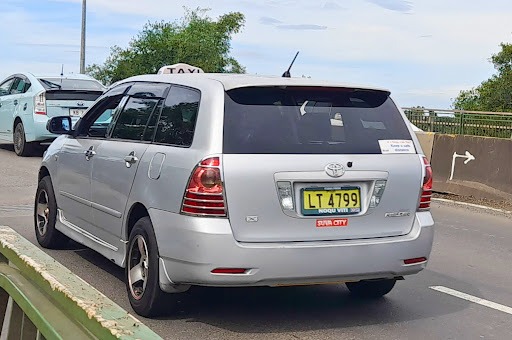
There are three types of yellow plates in Fiji. For registered taxis, their plates will have something like, ‘LT 3452’, ‘LT’ refers to licensed taxis. However, taxis in Nadi and Lautoka do not have LT on their number plates but ‘ND’ and ‘LTK’ on their blue number plates instead. This was a result of a zoning initiative that started back in April of 2019. Minibuses have ‘LM’ at the start of their plate for licensed minibus and rental vehicles will have ‘LR’ on their plates for licensed rental.
Available public transportations in Fiji
Fiji has three types of public transportation operating on its roads, these are buses, minibuses and taxis. Knowing the difference should at least provide you some comfort-buses are the cheapest form of travel while minibuses are the swiftest and taxis are expensive but yet comfortable. There aren’t any trams in Fiji and the nation’s only trains are reserved for the easy conveyance of canes to its various sugar mills located in the western towns of Viti Levu.
Buses operate only on the larger islands of Viti Levu, Vanua Levu and Taveuni. Village carrier trucks and private vehicles operate on islands that have roads, and taxis in all three of the above-mentioned islands, including Ovalau, home of Fiji’s old capital, Levuka.
Travelling in public transports
Minibuses but especially buses are preferred by locals and therefore will be crowded. With a narrow aisle and congested seating, it’s easy to feel out of place in such a vehicle but when you board and decide to get off at your destination, here’s what to do. Look toward the side of the window for either a button to push or a small string to pull- the string runs straight to the front where a small bell will be attached. Travelling in a minibus is likely the same but if there isn’t a button to push, you can simply knock twice on the side of the window, which will be in coach.
Fares A lot of transactions in Fiji are cash transactions with limited options for card use. However, local buses operate on an electronic card system and you can get electronic disposable cards at any Vodafone outlets near you. Fines are heavily imposed on those that use cash for bus services, including the bus drivers that encourage such activity.
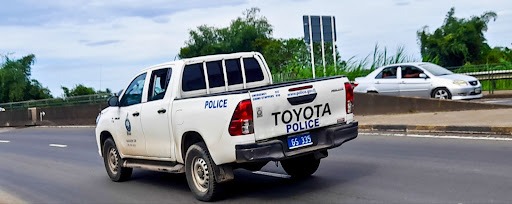
A state/government vehicle. Driving Kind reminder for those getting a rental, motorists drive on the left-side of the road and roads in the rural outback can be quite rough, narrow and unkempt. Also take precaution when driving in rural areas, in the case of an unlikely breakdown you could be stranded for a while. Try and take a local driver with you if you can.
Fiji roads Roads in the city and urban areas are well-kept but roads in rural areas can be quite unduly for foreigners. Perhaps the biggest grievance will be potholes, a problem that Fiji can’t seem to get rid of. Street lights are also heavily concentrated in the urban areas, thus driving at night can be dangerous as livestock will be loose and many of Fiji’s coastal roads have sharp bends.
Any related land transport registration and queries are dealt with the Land Transport Authority (LTA).
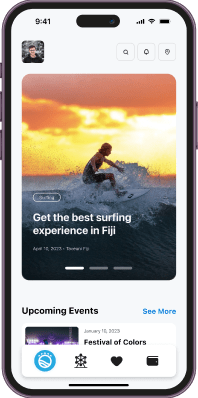
More Articles

How to make Fijian pumpkin curry
March 29, 2024
Pumpkin curry is a flavourful and comforting dish that is enjoyed in many cuisines around the world. This vegetarian curry ...
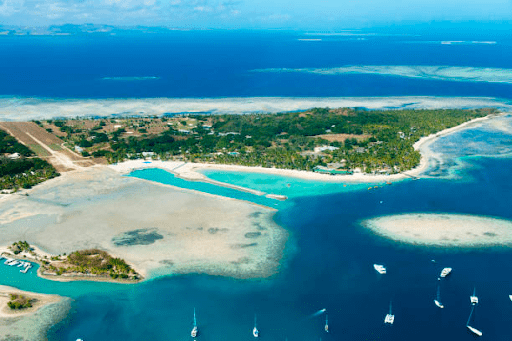
Fun Facts and Frequently Asked Questions about Fiji
March 27, 2024
Where is Fiji located? Fiji is an archipelago located in the South Pacific Ocean, about 2,000 kilometres northeast of New ...
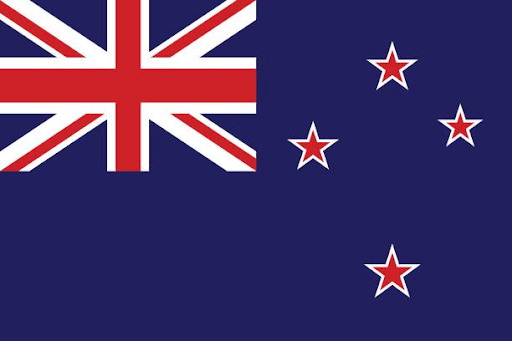
Traveling to Fiji from New Zealand
March 25, 2024
Planning a trip to Fiji from New Zealand? Look no further! In this article, we’ll provide you with all the ...

How to make Fijian samosas
March 22, 2024
Samosas are a popular and mouth-watering Indian snack that has gained popularity worldwide. These crispy, triangular pastries filled with a ...
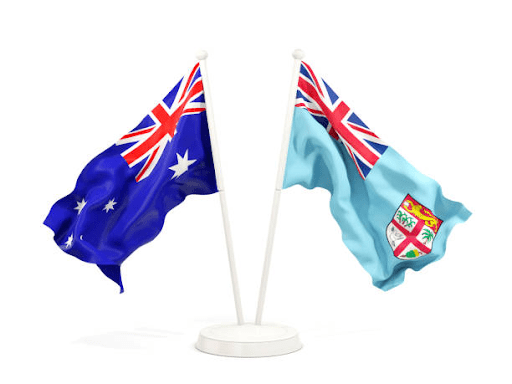
Traveling to Fiji from Australia
March 20, 2024
Planning a trip to Fiji from Australia? Look no further! In this article, we’ll provide you with all the details ...
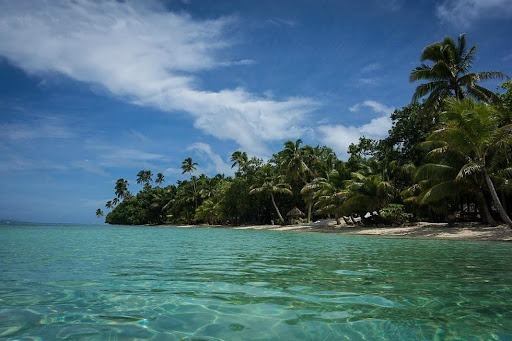
How to Explore Lomaiviti Island on A Budget
March 18, 2024
Lomaiviti Island, located in Fiji, is a perfect destination for budget travellers looking for a tropical paradise without breaking the ...
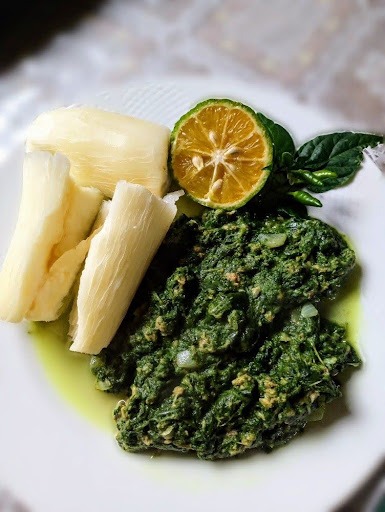
Fijian Lamb Rourou Recipe
March 15, 2024
Lamb rourou is a traditional Fijian dish that combines tender lamb with the flavours of taro leaves and coconut milk. ...
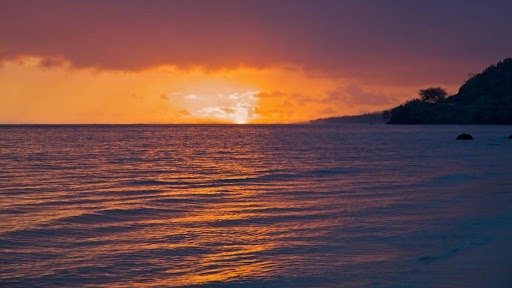
Best Sunset Spots in Fiji
March 13, 2024
Here’s a guide to some of the most breath-taking locations where you can catch those amazing sunsets: Sunset Beach, Sigatoka: ...

- About GoFiji
- Fiji Travel Guide
- Deals & Promotions
- Events & Festivals
- Become a Partner
- Privacy Policy
Download GoFiji Mobile App


IMAGES
COMMENTS
Safety. Crime in Fiji includes robbery, theft, violent assault, sexual assault and home invasions. Most crime is opportunistic. The highest risk is in urban areas and at night. Be careful in downtown Suva after dark. Credit card fraud and ATM card skimming occur. Protect your PIN and be alert when using ATMs. Regularly check your card and bank ...
Travel Requirements for Fiji: Visas, COVID Guidelines, and Care Fiji Commitment. When planning your trip to Fiji, it's essential to be aware of the travel requirements in place. This guide provides information on visas, COVID-19 guidelines, and the Care Fiji Commitment, ensuring you have a smooth and enjoyable experience during your visit.
Monitor travel advisories and alerts and read travel tips from the US Department of State. Enroll in the Smart Traveler Enrollment Program (STEP). Leave a copy of your itinerary, contact information, credit cards, and passport with someone at home. Pack as light as possible, and leave at home any item you could not replace. While at your ...
Elsewhere, you'll want to bring your own bottled water or carry a filter, like a Lifestraw, to drink from. 13. Take extra care in the cities after dark. When it comes to safety in Fiji, follow the same precautions you'd take in any major city. Stow your belongings out of sight and keep your wits about you.
Travelling to Fiji. Effective 14 February 2023, international travellers arriving into Fiji by air or sea will no longer be required to provide proof of COVID-19 vaccination and travel insurance to enter Fiji. However, its a good idea to ensure you understand your country's latest restrictions on travelling to and from Fiji.
Travel Tips COVID-19 Tests Fiji commenced testing for COVID-19 locally at the Fiji CDC from 11th March 2020 using molecular-based Real-time Quantitative Reverse Transcription PCR testing.
Enroll in the Smart Traveler Enrollment Program (STEP) to receive security messages and make it easier to locate you in an emergency. Call us in Washington, D.C. at 1-888-407-4747 (toll-free in the United States and Canada) or 1-202-501-4444 (from all other countries) from 8:00 a.m. to 8:00 p.m., Eastern Standard Time, Monday through Friday ...
Thanks to high levels of population immunity and a significant decrease in COVID-19 related deaths and hospitalizations, the situation has stabilized. For travellers arriving in Fiji by air or sea, proof of COVID-19 vaccination is no longer required. And while travel insurance isn't mandatory, it's highly recommended to cover any unexpected ...
The Fiji Travel Tips That You Need to Know About. With 333 islands of rugged volcanic beauty topped with lush tropical forest lining golden sand beaches, Fiji has a way of enchanting travellers to explore its breathtaking array of islands, coral reefs, authentic villages and vibrant cities. You've seen the pictures of turquoise waters filled with tropical fish, you've heard of the friendly ...
Need information on visiting or living in Fiji? Read the Australian Government's: Travel advice for Fiji; Tips for travellers; Explanation of Travel advice levels ; Changes to Smartraveller: What you need to know The Department of Foreign Affairs and Trade is committed to helping Australians in difficulty overseas, including those impacted by a crisis. ...
Exercise normal precautions in Fiji. Some areas have increased risks. Read the entire Travel Advisory. Read the country information page for additional information on travel to Fiji. If you decide to travel to Fiji: Enroll in the Smart Traveler Enrollment Program to receive security messages and make it easier to locate you in an emergency.
Fiji is an archipelago of more than 330 islands, with Viti Levu and Vanua Levu being the two largest islands. In the South Pacific Ocean, Fiji is northeast of New Zealand and approximately 1,300 miles (2,100 kilometers) northeast of Sydney, Australia. Climate and Seasons 🌞🌧️. Fiji enjoys a tropical climate with warm temperatures year-round.
The wet season is hotter and more humid, with temperatures around 22-33 ° C (72-91 ° F) and an average monthly rainfall of 180-310mm (2.8-6″). This is also Fiji's cyclone season, which means there's a risk of cyclones (but only a risk, which you can learn more about in How to Prepare for a Cyclone in Fiji).
Fiji Hotel and Tourism Association (Tourism trade association - Updated [2024]) Safe Travel (New Zealand travel advisory for Fiji - Updated [2024]) Smart Traveller (Australia travel advisory for Fiji - Updated [2024]) Travel.State.Gov (U.S. travel advisory for Fiji - Updated [2024]) Our editorial standards: At Fiji Pocket Guide, we uphold ...
Fiji Travel Guide. Last Updated: August 14, 2024. Fiji is a collection of islands spanning over 1,600 kilometers in the South Pacific Ocean. There are two main islands, Viti Levu and Vanua Levu, and nearly 900 smaller islands and inlets. Settled thousands of years ago by Austronesian peoples, Europeans made landfall in 1643 when Dutch explorer ...
Get ready for your Fiji journey with expert transportation tips featured in our latest blog on GoFiji.net. Learn about navigating the islands, local transport options, and scenic routes. Make the most of your Fijian adventure by ensuring a seamless travel experience. Explore Fiji confidently with our transportation insights!
Safety. Fiji is generally a safe place to travel. However, visitors to Fiji may fall victim to petty crimes such as theft or ATM skimming. Avoid walking alone at night in urban areas, particularly downtown Suva, lock your car if you have one and keep expensive valuables out of sight.
We've reviewed our advice for Egypt and have lowered the overall travel advice level. We now advise exercise a high degree of caution due to the threat of terrorism. We continue to advise Do not Travel or Reconsider Your Need to Travel to several areas due to threats including higher risks of terrorism or serious crime - read our advice carefully.
An Intro About Fiji. Location: Fiji is located in the South Pacific in the continent of Oceania.Fiji sits in the centre of Tonga, Wallis and Futuna, Vanuatu and New Caledonia and is about two-thirds of the way between Hawaii and New Zealand.. Land size: 18,274 km 2 (7,056 sq mi). Climate: Daily average temperature - 25.5 ° C/77.9 ° F, average rainfall 1,826mm/71.9″ - 3,065mm/120.7″.
Discover Fiji, where happiness comes naturally. Explore our breath-taking islands, vibrant culture, and stunning landscapes. Plan your perfect getaway today! All you need to know about accommodation, things to do and holidaying in Fiji. With 333 islands nestled in the heart of the South Pacific, Fiji is Where Happiness Finds You.
Be fully vaccinated if over 18 years old. If you're over 18 you must be double vaxed and show your vaccination certificate to enter Fiji. Australia however requires everyone over 12 to be vaccinated to leave the country (or show exemption). Fiji recognises Astra-Zeneca, Pfizer, Moderna and Johnson & Johnson vaccines.
Safe Travel (New Zealand travel advisory for Fiji - Updated [2024]) Smart Traveller (Australia travel advisory for Fiji - Updated [2024]) Travel.State.Gov (U.S. travel advisory for Fiji - Updated [2024]) Our editorial standards: At Fiji Pocket Guide, we uphold strict editorial standards to ensure accurate and quality content.